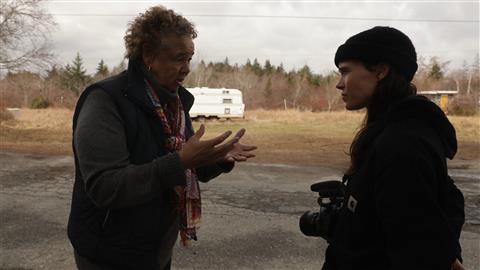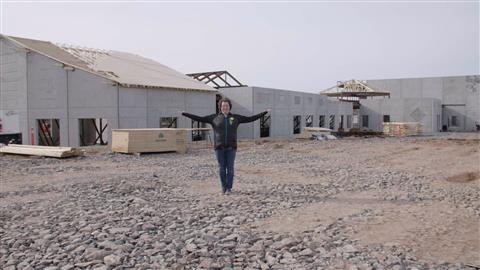KJIPUKTUK (Halifax) – Sometimes seeing a film is like going to school. A really good school. Staying open and allowing ourselves to move out of our comfort zone, we gain a whole new understanding of ourselves, our communities, and our world. That information then allows us to use our voices for change. Some of us need that visceral nudge.
The Atlantic International Film Festival (AIFF), also known as FIN, is giving us that nudge this year. They are running the strongest lineup of local documentaries I’ve seen in awhile. Films like There’s Something in the Water, The Mill, and Conviction.

There’s Something in the Water, directed by Ellen Page and Ian Daniel and based on the book of the same name by Dr. Ingrid Waldron, examines not only the effects of Nova Scotia’s racist government policies that allowed dumps in Black and Indigenous communities, but it illustrates how those communities are fighting back.

The Mill, written and directed by David Craig, and based on Joan Baxter’s excellent book of the same name, is about the pulp mill in Pictou County, Nova Scotia that has pumped its dirty effluent into Boat Harbour (Pictou Landing First Nation territory) for 53 years. With the January 2020 deadline to discontinue this practice looming, the mill is predictably asking for an extension. The government is so far refusing. The fishers, Indigenous and non-Indigenous alike, are vowing to continue fighting to keep pipes out of the waters.
See also: A message from Chief Andrea Paul: The forever argument of economy and jobs
As one community activist said, “Humans have figured out how to alter DNA, surely we can figure out how to dispense with effluent without dumping it into our waters.”
Conviction, written and directed by Nance Ackerman, Ariella Pahlke, and Teresa Macinnes, is a film about marginalized women incarcerated at the Burnside jail in Halifax, though it could be a prison anywhere in Canada. The women are in prison, not because that’s what they or society needs, but because there are no other supports available for those dealing with mental illness, addiction issues, childhood abuse, poverty.
The film is a collaboration between the filmmakers and the women who were asked to think big and answer the question, “what would have made a difference in your lives to keep you out of prison and what might be done now?”
With help from long-time prisoners’ rights advocate and now Senator, Kim Pate, and the Elizabeth Fry Society, among others, the women have come up with a viable solution to replace prison with recovery in community.
Think about that. Women with every societal strike against them are doing more than our elected officials to give us all livable thriving communities. As one viewer said, “This film is everything.”
See also: Inside Canada’s East Coast prisons (photos)
What these films show us is that the people of Nova Scotia are visionaries, the provincial and municipal politicians … not so much. The money is there. We could take a small fraction of the billions currently being used to incarcerate people or wasted on the still empty brand spanking new hotel at the Nova Centre. The list goes on and on. We could take that money and clean up the toxic waste dumps. We could fund From the Ground Up, the community proposed in Conviction to replace incarceration.
Elections are coming for all levels of government — the feds next month, provincial and municipal next year. We can make a difference. These films give us hope, but the people on the line need us to do our part. That could be as simple as contacting our elected officials. Especially in an election year, it’s critical to let them know how we feel.
Note: An earlier version of this review incorrectly stated that Conviction was about women incarcerated at the Nova Institution for Women in Truro. Although some of these women contributed, the women featured in the documentary were incarcerated at the Central Nova Scotia Correctional Facility in Dartmouth (also known as the Burnside jail).
See also: Weekend video: Four feet up
With a special thanks to our generous donors who make publication of the Nova Scotia Advocate possible.
Subscribe to the Nova Scotia Advocate weekly digest and never miss an article again. It’s free!




Excellent film reviews!!
Thanks, Judy.
Loved the article! I’m in Conviction, I’d just like to offer a correction, the women in the film were housed at the jail in burnside. Some women from Nova in Truro contributed as well.
We hope to #buildcommunitiesnotprisons
Thank you for your attention to our message.
Thanks so much for your feedback, Tanya. We will be updating the story shortly to reflect your correction. And thank you to you and all the women for your work.